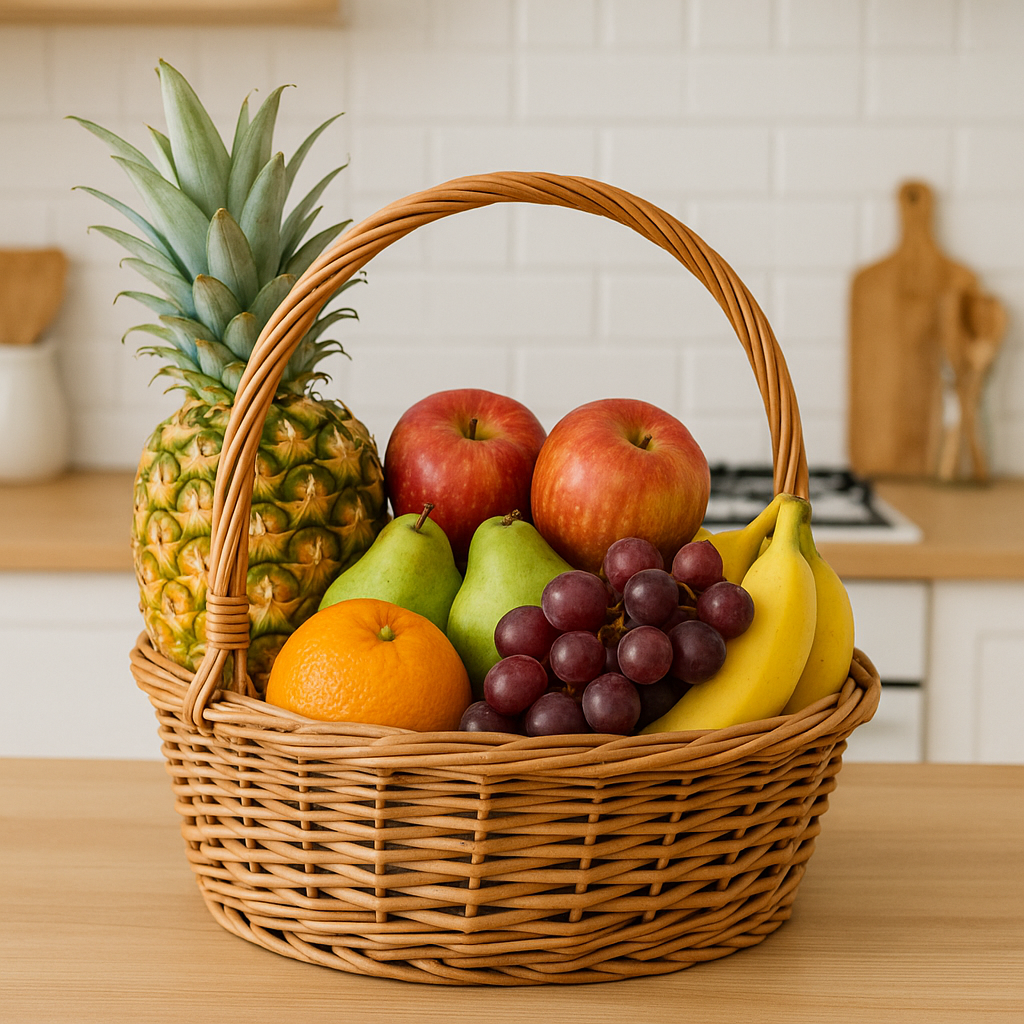
Best Fruits for Weight Loss: A Natural Path to Shedding Extra Pounds
When it comes to losing weight, one of the most effective strategies is to incorporate more natural, nutrient-dense foods into your diet—especially fruits. While fruits do contain natural sugars, they are also rich in fiber, vitamins, antioxidants, and water, which help you feel full longer and improve digestion.
In this article, we explore the top 10 best fruits for weight loss, how they work, and how you can include them in your diet to support healthy fat loss.
1. Grapefruit: The Metabolism Booster
Why it’s effective: Grapefruit is a low-calorie fruit known to reduce insulin levels and improve metabolic function. Studies have shown that eating half a grapefruit before meals can help reduce belly fat and aid weight loss.
- Calories: 52 per half
- Fiber: 2 grams
- Benefit: Boosts fat metabolism, controls appetite
How to use: Eat it fresh, in salads, or blend into detox smoothies.
2. Apples: The Natural Appetite Suppressant
Why it’s effective: Apples are high in soluble fiber, which slows digestion and keeps you feeling full. They’re low in calories and great as a snack to curb cravings.
- Calories: 95 (medium)
- Fiber: 4 grams
- Benefit: Promotes fullness, stabilizes blood sugar
How to use: Slice into oatmeal, enjoy raw with nut butter, or bake for a healthy dessert.
3. Berries: Low in Calories, High in Antioxidants
Why they’re effective: Strawberries, blueberries, raspberries, and blackberries are rich in antioxidants and fiber but low in calories. They also help regulate blood sugar and reduce inflammation, which can support weight loss.
- Calories: ~50 per cup
- Fiber: 3–8 grams depending on type
- Benefit: Controls sugar cravings, enhances metabolism
How to use: Add to yogurt, smoothies, or whole-grain cereal.
4. Watermelon: Hydration with Few Calories
Why it’s effective: Watermelon is 90% water, making it incredibly filling and hydrating without adding excess calories. It also contains citrulline, which may help reduce fat accumulation.
- Calories: 30 per 100g
- Water content: 90%
- Benefit: Keeps you full, reduces water retention
How to use: Eat fresh, freeze into popsicles, or blend into a refreshing drink.
5. Avocado: Healthy Fat for Fullness
Why it’s effective: While higher in calories, avocados contain monounsaturated fats that are heart-healthy and help reduce belly fat. They also have a creamy texture that satisfies hunger better than many low-fat foods.
- Calories: 160 per 100g
- Healthy Fats: 15g per 100g
- Benefit: Promotes satiety, regulates fat-burning hormones
How to use: Mash on whole-grain toast, add to salads, or blend into smoothies.
6. Bananas: The Energy Fruit
Why it’s effective: Bananas are rich in potassium, resistant starch, and fiber. They help reduce bloating and regulate digestion, making them a great pre- or post-workout snack.
- Calories: 105 (medium)
- Fiber: 3 grams
- Benefit: Reduces bloating, boosts workout performance
How to use: Slice into smoothies, oatmeal, or eat plain with a dash of cinnamon.
7. Pears: High in Fiber and Low in Calories
Why it’s effective: Pears are among the most fiber-rich fruits, making them excellent for improving digestion and promoting fullness. They also have a low glycemic index.
- Calories: 101 (medium)
- Fiber: 5.5 grams
- Benefit: Fills you up longer, controls blood sugar
How to use: Eat whole, poach with spices, or dice into salads.
8. Papaya: The Digestion Helper
Why it’s effective: Papaya contains papain, an enzyme that improves digestion and reduces bloating. It’s low in calories and rich in vitamins A and C.
- Calories: 59 per cup
- Fiber: 2.5 grams
- Benefit: Aids digestion, reduces water weight
How to use: Blend into smoothies, make a fruit salad, or eat plain with lime.
9. Kiwi: Small but Mighty
Why it’s effective: Kiwi is rich in fiber, vitamin C, and enzymes like actinidin, which aids digestion. It’s low in calories and great for gut health.
- Calories: 42 per fruit
- Fiber: 2 grams
- Benefit: Improves digestion, curbs cravings
How to use: Scoop with a spoon, slice into salads, or blend with spinach and pineapple.
10. Pineapple: The Fat-Burning Enzyme Fruit
Why it’s effective: Pineapple contains bromelain, a digestive enzyme that helps break down protein and reduce inflammation. It also satisfies sweet cravings naturally.
- Calories: 82 per cup
- Bromelain: Anti-inflammatory enzyme
- Benefit: Aids fat breakdown, improves gut health
How to use: Add to stir-fries, fruit salads, or grill for a tropical treat.
Final Tips on Using Fruits for Weight Loss
- Pair with protein: Combine fruits with nuts, seeds, or yogurt for longer-lasting satiety.
- Watch portion sizes: Even natural sugars can spike blood sugar if eaten in excess.
- Go fresh: Avoid canned or syrupy fruits high in added sugars.
- Use in meals/snacks: Smoothies, breakfast bowls, and fruit-based snacks are effective ways to stay full.
Conclusion
Fruits are not just sweet treats—they’re powerful allies in your weight loss journey. From hydrating watermelon to fiber-rich pears and fat-burning grapefruit, nature provides everything you need to shed extra pounds in a healthy and sustainable way. Incorporate a variety of these fruits into your daily meals, stay active, and hydrate well to see real results.
References
- U.S. Department of Agriculture (USDA) FoodData Central
- https://fdc.nal.usda.gov
- Nutritional data on individual fruits such as apples, bananas, grapefruit, etc.
- Harvard T.H. Chan School of Public Health – The Nutrition Source
- “Vegetables and Fruits”
- https://www.hsph.harvard.edu/nutritionsource/what-should-you-eat/vegetables-and-fruits/
- Covers the role of fruits in weight management and disease prevention.
- Mayo Clinic – Nutrition and Healthy Eating
- “Can eating fruits and vegetables help you manage your weight?”
- https://www.mayoclinic.org
- Guidance on choosing low-calorie, high-volume foods like fruits.
- National Institutes of Health (NIH) – Office of Dietary Supplements
- Information on fiber, potassium, and dietary guidelines.
- https://ods.od.nih.gov
- Appetite Journal
- “Effect of grapefruit consumption on body weight and insulin resistance”
- PMID: 15640470
- https://pubmed.ncbi.nlm.nih.gov/15640470/
- Journal of Nutrition
- “Dietary Fiber and Weight Regulation”
- https://academic.oup.com/jn/article/132/5/1051/4687713
- Discusses how dietary fiber contributes to satiety and fat reduction.
- Nutrition Reviews
- “The role of dietary fruit intake in weight management”
- https://academic.oup.com/nutritionreviews/article/68/5/259/1848380
- Cleveland Clinic – Health Essentials
- “Is Fruit Good or Bad for Weight Loss?”
- https://health.clevelandclinic.org
- British Journal of Nutrition
- “Effect of fruit-based diets on lipid metabolism and weight control”
- https://www.cambridge.org/core/journals/british-journal-of-nutrition
- World Health Organization (WHO)




